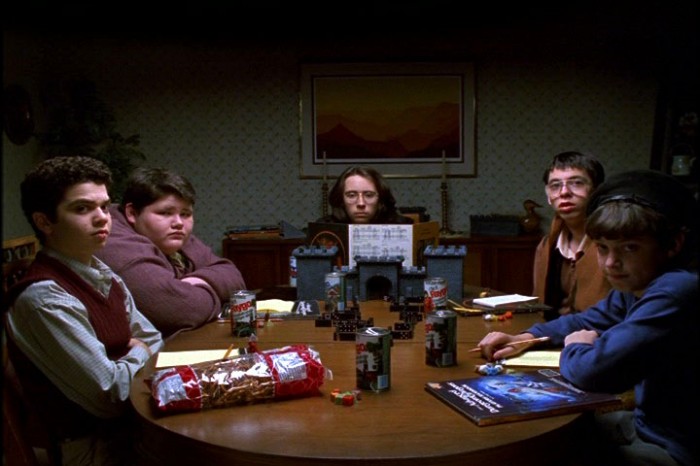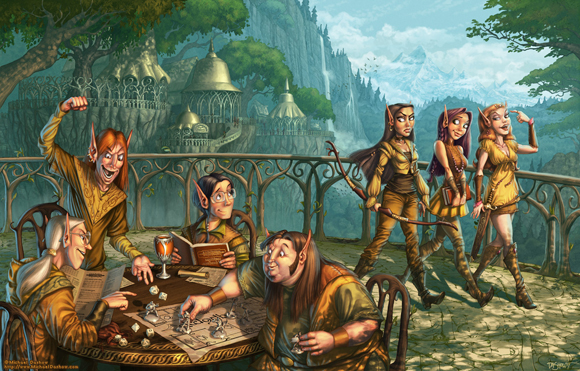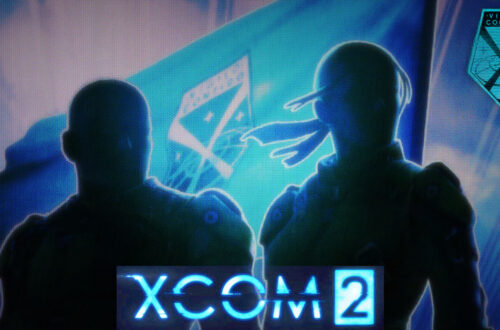Power v. Personality
When it comes to Pen and Paper RPG’s there seems to be a sliding scale that is used to describe how a player approaches both their character and the game. On one end of this imaginary scale is the powergamer who is actively pursuing the game to its highest numerical end. They completely disregard of the personality of the character, having only the barest of bones to role play with: generally race, class and sex. On the other end stands the Complete Roleplayer, giving up every numerical advantage they can to have their character as close to the vision of the player as they can.
Neither end can really comprehend the other, as they are as antithetical to one another as the shadow is to light. Many times these two extremes, whether both are in the same group or not, will tear at any player in the center. These centrists represent the backbone of RPGs, the traditional player who wants nothing more than to have both an effective character in combat and also while having a reasonably developed personality.
As the years have worn on, this central player has more and more disappeared, replaced by the two extremes. I’ve played D&D since I was around 12. I started in AD&D, moved to AD&D 2e, playing that for a very long time. After 3.0 came out, I did eventually grab the game, and grew to love 3.5. With the advent of 4e, I reflected on the fun that 3.0/3.5 had brought, and decided to run with 4e and see where it took us. I’ve also played Vampire, Gamma World, d20 Modern, Silver Age Sentinels, and the IKRPG. I dabbled a little in Savage Worlds and Exalted. Every game I played had its own dynamic, but they invariably contained people further along the spectrum towards either Personalities or Powergamers or both. lately, however, I have seen harder and harder stance towards one or the other, with little thought given to meeting in the middle. During these games, these two sides almost always would clash, causing player tension, which is the death of any game.

What really causes the divide is that there is a significant mental difference between the two perspectives starting points in playing the game. Powercentric players seek out and create a powerful character, placing a personality and character attributes around the core of the powerful character like a shell. It can be a very detailed and pretty shell with layers of color and different patterns, but it is still, ultimately, a shell. Personalitycentric players will seek to create a character and then fill out that character with abilities that match it. While its pretty and gorgeous on the outside, with the most fantastic styling, excruciating precise details and deep roots to the center, the core can be very rotten. The rules and abilities that they pick are based on color, not on taste. Its a very basic difference that is hard to describe, and even harder to acknowledge, as they are simply incomprehensible to the other.
D&D has always been the poster child for the powercentric because it enables a massive selection of choices that inevitably devolve into combat choices. Even the most character driven player becomes wary of the danger and finality of combat, and combat effectiveness becomes the focus of almost every character. When the figurative life of the character you have built through your mental power, given breath through your force of personality, and become attached to through shared experience is in jeopardy, players almost always start crunching numbers to make sure their emotional investment sticks around, because numbers are the only defense you have against death in that game.
But there are, inevitably, people for whom the puzzle of creating a powerful character is the original draw, for whom the the death of the enemy is not enough, and nothing but their total numerical annihilation will suffice. These are the people who strove to hear M. Bison yell “Perfect!” at the end of a match. They hunt down every complex interaction and every written rule that they can glean an edge from. They hunt down every +1 and each additional die that they can add to their characters sheet. They are little more than the complex number generators of a video game wrapped in paper. I find that there is no joy, no fun, in those characters. There is only the hollow victory before you need to get the next level, the next feat or ability that will allow you to do more numbers. When all your game decisions are made for you because they are factually the best its much harder to create a character that is believable, especially after the first. When every character you play has the same basic core, there is nothing new about it, no matter the color of the shell.
As another extreme, if you take a personality player and have them make a character who has a fully fleshed out life, has a family, a job, and a solid roof above his head. What reason does this character have to be in the game? what reason could possibly make him leave his comfortable life? each of his four children are painstakingly detailed, as well as his boss and his family tree. The layout of the house he lives in includes rooms for the kids, the stables and the cook. Maybe the character is a loner, someone who just likes it better on their own, without the interference of people of lesser skill. He’s been a hardened veteran of countless countless battles, and has no trust of the world. Neither of these characters is part of the world, they are either above it or contained by it. They could have the strongest rules set to back them or none at all, but they are as useful as a heap of used diapers.
I try to stay in the center, as Building my character to be powerful gives me a sense of accomplishment, but that accomplishment means nothing if I stare at my belly button between combats. I’ve taken a character’s bare bones idea and fleshed it out to be the best that concept can be. My most personally powerful character was a complete accident, one that a friend of mine had to unfortunately suffer through DMing as he was an unstoppable force of Magic. Now, I do have to say that I only played in an Epic Level 3.5 game once, and man was it insane, but I tend to stay between 1 and 15, so my power curve is a little shorter than most. Endrus “Hammer” Tolsien was a Human Mage (enchanter) that didn’t have a single offensive damage spell. What he had was Spell focus and a build created to make his enchantments extremely robust. Hold, Charm person, Charm Monster, Mass Hold, Slow, Haste, the list goes on and on. What really made him bonkers was that he was super-effective against anything alive and enchantable, but was also extremely good at buffing the party to take on things that were not. Oh, and he used a Maul, in combat if necessary, and I took feats and abilities to make it so he was good at it, because it was in his story and background I had written for it. No other game would allow me the freedom to create a character so detailed and rich and full of story that I have ever played. And that is the beauty of RPG’s: They are small scale acting studios with a game behind them.
None of it all matters, though, when the understanding of the core of the game flies out the window. When the Personality player creates something that is so detrimental to the group that it is divisive, when the Power player creates a character who’s very essence nullifies the rest of the groups existence, or when the middle creates a character that wants to stay home and do nothing. Everyone can be equally guilty at making the game no fun for anyone other than themselves.
What really is at the heart is that the game is a group game, set up between more than a single person. While you want to create the character that fits you the most, always keep in mind that there are other people at the table as well, including the GM, that are there to have fun. If your character, by their simple existence, is making someone else not have fun, you’re doing it wrong. You can build a powerful character that is the bane of the strongest monster without nullifying the DM, and you can create a dark character without having him be forced to come along for the ride. When creating a character you have to keep in mind that the whole game is based around going on adventures, and that the personality you create, bare or obese, needs to be able to go out on these adventures with others, and that these others need to have as equal a spotlight as you. I’m as guilty as anyone else is about breaking these rules, but I try hard to keep these in mind, letting other speak, kill monsters, and take the spotlight.
If you can’t you should probably go find a video game to play, because playing by yourself will be just as satisfying. I’ve heard Neverwinter Nights and Baldurs Gate are very, very good.


One Comment
Moondog
Awesome use of Timmy artwork. 🙂
Well put throughout. I think you hit on one of the biggest reasons that “power gamers” (most specifically: combat power gamers) can lead to problems in a group: they are usually approaching the game more like a board game. In my experiences playing P&P games, an average combat power gamer would probably be just as happy (or more so) playing something like Descent or Super Dungeon Explore. They genuinely enjoy the combat aspect of the game, but the rest of it, not so much.